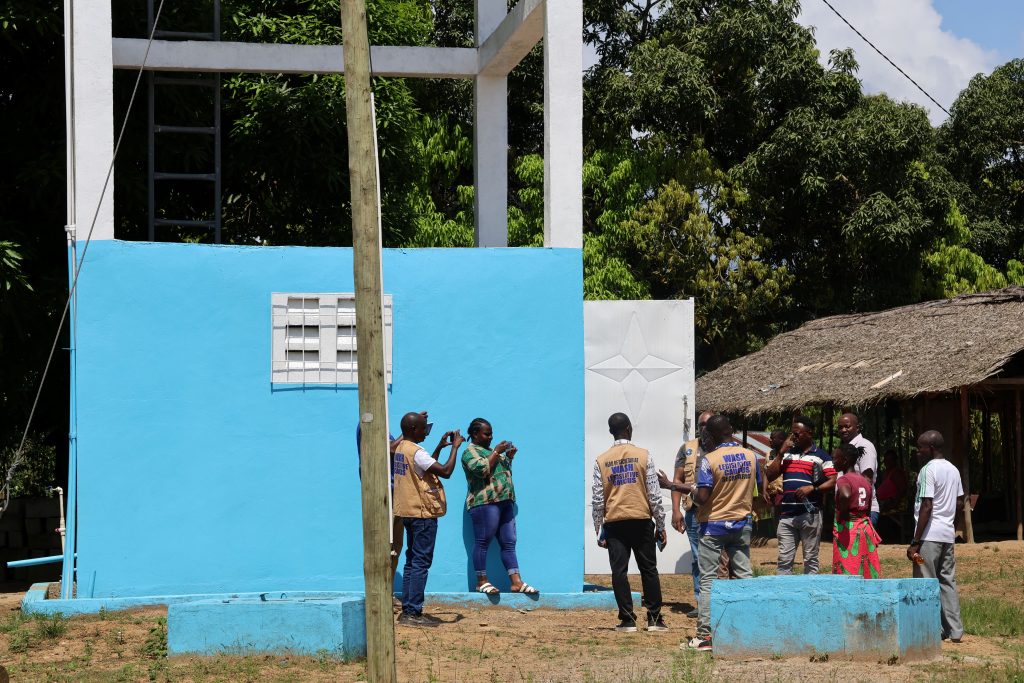UNDP, WASH Caucus Assess ACDP Projects in Gbarpolu County-Highlights Sustainability Needs
Monrovia, Liberia; November 14, 2025 — For more than five decades, residents of Mardina and surrounding communities in Gbarpolu County endured severe water shortages, relying on unsafe streams that fueled recurring cholera outbreaks.
Today, that reality is changing thanks to the Accelerated Community Development Programme (ACDP), a joint initiative of the Government of Liberia and the United Nations Development Programme (UNDP).
Since 2023, ACDP has been installing solar-powered water systems in rural and urban communities across Liberia to provide environmentally sustainable and equitable access to basic water, sanitation, and hygiene (WASH) services by 2025.
Mardina, home to about 1,855 residents, is among the beneficiaries—and the impact has been transformative.
“We have not experienced cases of cholera since the installation of this water system,” said Mardina Town Chief, Mr. Beyan S. Sirleaf, smiling as he pointed to the protected borehole. “Even during the dry season, we don’t struggle to get water because the machine keeps pumping water into the tanks. We just turn the tap and get clean water.”

Sirleaf added that neighboring communities also benefit from the system, though he appealed for the project to be extended further. “Our neighboring towns come here for water. It’s far for some, but it’s worth it because they get clean water.”
Field Assessment and Community Engagement
On November 11, the WASH Legislative Caucus, led by Representative Thomas A. Goshua II, joined UNDP and Gbarpolu County Superintendent Mr. Sam K. Zinnah for a one-day high-level field assessment of ACDP projects.
The team visited Mardina, Bopolu, and Totoquelleh Towns, where solar-powered boreholes, water towers, and kiosks have been constructed. Across Gbarpolu County, 12 kiosks now provide safe water to thousands of residents.
The delegation also toured a newly constructed agri-processing facility and storage hub, handed over in June, underscoring ACDP’s broader goal of improving access to essential services in rural Liberia.
During community meetings, officials discussed sustainability plans and local management mechanisms. Representative Goshua stressed the need for stronger government ownership of donor-funded projects.
“My interest in the WASH sector is because it directly affects the lives of our people,” Goshua said.
“Often, donors take the lead in funding while the government’s contributions are minimal. This visitaims to highlight our own commitments and ensure that the projects we endorse meet the standards and expectations of our communities.”
He pledged that the Legislative Caucus would continue to advocate for timely government contributions, including the release of US$692,341 allocated under the 2025 Public Sector Investment Program (PSIP).
Commitment to Sustainability
Superintendent Zinnah commended UNDP and lawmakers for ensuring rural communities are not left behind, noting that some areas remain hard-to-reach and require motorbike access.
He emphasized that projects like ACDP are critical to achieving the principle of Leave No One Behind.
Echoing this, Mr. Stanley Kamara, UNDP Team Leader for Inclusive Governance, highlighted the program’s innovative approach.
“We are introducing climate-smart water systems as part of providing basic social services. Unlike traditional hand pumps, these hybrid systems operate using solar energy, generators, or state power.
Each water infrastructure has a management team responsible for operations, and communities also use the kiosks to charge phones and generate income.”
Kamara added that women’s groups in Bopolu and other communities have received small business grants to help sustain the facilities and support their families.
According to ACDP’s interim Programme Manager, Boye Johnson, Bopolu hosts a climate-smart water infrastructure comprising a borehole, water tower, four kiosks, and an agricultural hub.
Totoquelleh has similar infrastructure with five kiosks, while Mardina Town has three kiosks and a cooperative mini office.
Johnson described the ACDP as a “flagship programme” designed to address rural poverty by expanding access to essential services.
“The ACDP is a national flagship program aimed at lifting people out of poverty. Poverty mainly affects rural areas because they often lack access to basic services such as water and healthcare,” Johnson explained.
He added that beyond water, the ACDP also covers agriculture, health, and education.
UNDP and the Ministry of Health will soon begin partial renovations at the Tellewoyan Hospital in Voinjama, Lofa County, focusing on maternity, delivery, and operating rooms.
Looking Ahead
The mission concluded with a press briefing and a live radio talk show, highlighting the importance of aligning donor initiatives with Liberia’s national development goals.
Stakeholders reaffirmed their commitment to expanding climate-smart WASH solutions and strengthening local management systems to ensure long-term sustainability.
ACDP, jointly funded by the Government of Liberia (US$3 million) and UNDP (US$1.5 million), continues to serve as a model for community-driven, multi-sector development aimed at bridging the gap between urban and rural living conditions.
It seeks to reduce poverty and inequality by improving access to clean water, sanitation, agriculture, health, and education in line with the government’s ARREST Agenda.

Comments are closed.